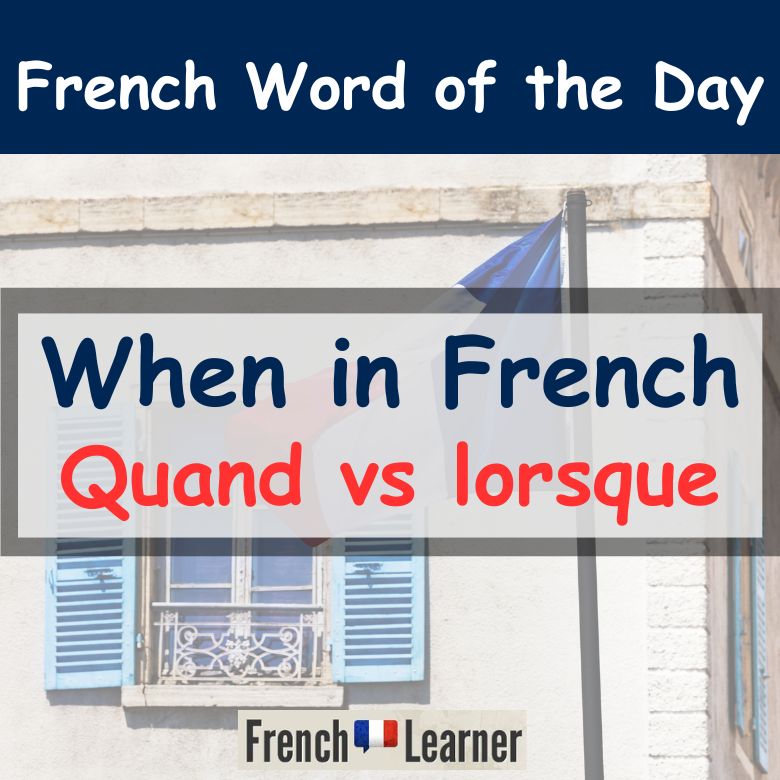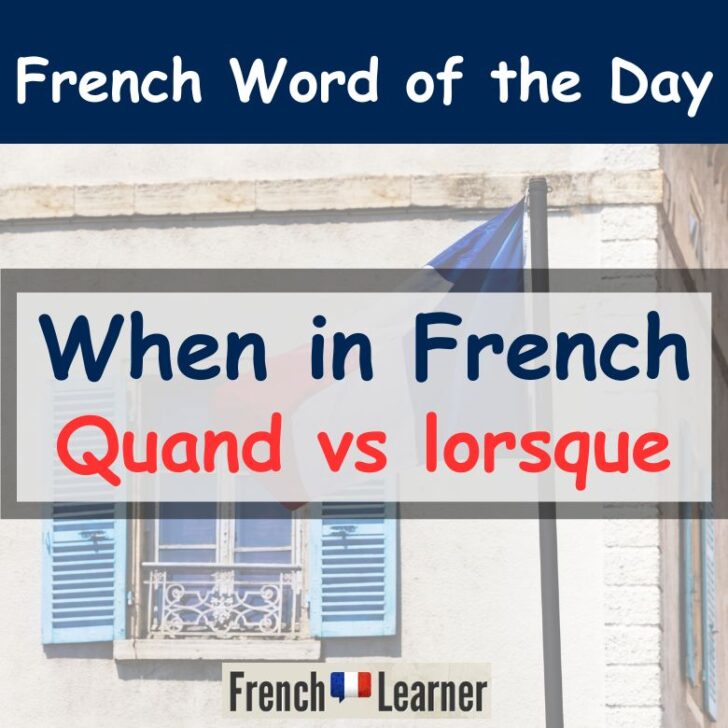The word for when in French is “quand” (pronounced kɑ̃). For example, “Quand est-ce qu’on commence?” (When are we are starting?). In this post we will discover how to use the word quand in sentences as well as explore several other French words for “when”. Towards the bottom of the post we’ll explain the meaning of “lorsque”, which is another word for when.
quand
when

How to say “when” in French
Before we go any further, let’s have a look at the pronunciation of “quand”. Using the phonetic symbols, the pronunciation is “k + ɑ̃”. The symbol “ɑ̃” is a nasal sound expressed by the letters “an“. This audio example for quand has a rising inflection, which would be used when asking a question.
quand?
when?
How to use quand when asking a question
The word “quand” is used to mean “when” when asking a question and seeking information. There is no set place for where to place quand within a question sentence. We’ll look at a few examples below.
The most common way to ask a question in French is to use the word “est-ce que”, which means is/are/do/does. To ask a “when” question, place quand before est-ce que. For example:
Quand est-ce que vous mangez la pizza?
When are you eating the pizza?
Another common and slightly more formal way to ask a question is to use inversion. This is when the subject and verb are inverted with a hyphen.
- Quand mangez-vous la pizza ? When are you eating the pizza?
In this next example, quand is being placed towards the end. This is a very informal and somewhat impolite way of asking the same question: When are you eating?
- La pizza, vous la mangez, quand ? When are you eating the pizza?

Here are two more examples of how to use quand in questions:
Quand est-ce que le train part ?
When is the train leaving?
Quand est-ce que le film commence ?
When’s the movie starting?
Note that that for these sentences, both “à quelle heure?” (literally at what time) and “dans combien de temps” (literally in how much time) could also be used in the place of quand.
Depuis quand
The word “depuis“ means since. To ask how long an action has been occurring, use “depuis quand”, which translates to “since when”. For example:
- Depuis quand est-ce que tu étudies le français ? Since when (how long) have you been studying French?
Alors que
The conjunction “alors que“ can be used to mean “when” when talking about two opposing actions. Here’s an example.
- Il étudie l’italien alors qu’il devrait étudier le français. He’s studying Italian when he should be studying French.
Lorsque (vs. quand)
Another commonly used word for “when” is “lorsque”. In these sentences, “lorsque” does not mean “when” in the context of an information seeking question, for example, “Quand est-ce que tu arrives ?” (When are you arriving?). Lorsque is being used as conjunction. Here’s an example:
- J’ai commencé le français lorsque j’avais quatorze ans. I started French when I was fourteen years-old.
Here’s another example. This example uses the French future tense.
Je vous téléphonerai lorsque j’arriverai.
I’ll telephone you when I arrive.
It is important to note that the above two sentences can both be written with the word “quand”:
- J’ai commencé le français quand j’avais quarorze ans. I started French when I was fourteen years-old.
- Je vous téléphonerai quand j’arriverai. I’ll telephone you when I arrive.
However, “lorsque” cannot be used for “when” in the context of asking an information-seeking question. For example:
- Quand est-ce que tu commences ? When are you starting? (RIGHT!)
- Lorsque est-ce que tu commences ? When are you starting? (WRONG!)
The world “lorsque” can be used at the beginning of a sentence as synonym for “quand” when expressing a condition. For example:
- Lorsqu’il neige, les gens font du ski. When it snows, people go skiing.
- Quand il neige, les gens font du ski. When it snows, people go skiing.
Au moment où
Another word for “when” and a synonym for lorsque in the context of a conjunction is: “au moment où”. This can also translate to as, the moment and just as. For example:
- J’ai mis la table au moment où tu es rentré à la masion. I set the table when (the moment, as, just as) you came home.
Quel que soit le moment
To express “no matter when”, use the expression, “quel que soit le moment”. For example:
- Quel que soit le moment où j’y vais, il y aura trop de monde. No matter when I go, there will be too many people.
In the context of “at any time” to mean “no matter when”, use “n’importe quand”. For example:
- Tu peux me téléphoner, n’importe quand. You can call me, no matter when (at any time).

A few fun expressions
Now we’ll look at some common English expressions which use the word “when” and their equivalents in French.
When it rains it pours
- Quand ça va mal, ça va mal. Loose translation: When things are going badly, they go badly.
When the sh*t hits the fan
Here’s another fun expression. This one is very informal.
- Quand ça pétera à la gueule. Loose translation: When it farts from the mouth.
When the chips are down
- Dans les moments difficiles. Translation: During difficult times (or moments).
When push comes to shove
- Quand il le faut. Literal translation: When it’s necessary.
When the dust settles
- Quand les choses se seront tassées. Literal translation: When things will be compressed.
Cross that bridge when you get to it
- Voir le moment venu. Literal translation: To see the moment come.
When it’s all said and done
- En fin de compte/au bout du compte. Literal translation: At the end of the account.
When’s the baby due?
- C’est prévu pour quand? Literal translation: It’s predicted for when?
Conclusion
Congratulations! You now have a very clear idea of how to use quand (when) in French. Now take a look at our lesson covering the word où (where) in detail.
Discover more:


